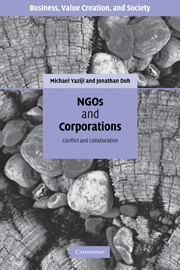Book contents
- Frontmatter
- Contents
- List of figures
- List of tables
- Preface
- Foreword
- Acknowledgments
- Part I Understanding NGOs
- Part II NGO advocacy campaigns
- Part III Corporate–NGO engagement
- 7 Corporate–NGO engagements: from conflict to collaboration
- 8 Globalization, multinationals and NGOs: the next wave
- Case illustration: conflict diamonds
- Case illustration: Unilever in Indonesia
- Case illustration: microfinance and poverty reduction
- Part IV The future of corporate–NGO relations
- Index
- References
Case illustration: conflict diamonds
Published online by Cambridge University Press: 13 January 2010
- Frontmatter
- Contents
- List of figures
- List of tables
- Preface
- Foreword
- Acknowledgments
- Part I Understanding NGOs
- Part II NGO advocacy campaigns
- Part III Corporate–NGO engagement
- 7 Corporate–NGO engagements: from conflict to collaboration
- 8 Globalization, multinationals and NGOs: the next wave
- Case illustration: conflict diamonds
- Case illustration: Unilever in Indonesia
- Case illustration: microfinance and poverty reduction
- Part IV The future of corporate–NGO relations
- Index
- References
Summary
International advocacy NGOs, such as Global Witness and Amnesty International, are at the forefront of stemming the flow of conflict diamonds. Relationships between corporations and NGOs in this capacity gradually developed from adversarial to collaborative. Global Witness initially waged a negative relationship with Tiffany & Co. by protesting at its businesses and demanding change in the late 1990s. By 2004, however, Global Witness was praising Tiffany & Co. and working alongside businesses with the Kimberley Process Certification Scheme (KPCS). Global Witness has a vast sphere of collaborative influence, evident by the establishment of the KPCS and by continued involvement in and evolution of the project between industry, governmental and NGO representatives. Continued criticism of collaborative efforts reveals that corporate–NGO relationships sometimes suffer from the lack of a shared vision.
In May 2000, under pressure from a mounting movement against “blood diamonds” or “conflict diamonds,” the diamond industry convened with government representatives and civil society organizations in Kimberley, South Africa. This movement began in 1998 after Global Witness, an advocacy NGO, led the charge with a large-scale advocacy campaign that included protests outside Tiffany & Co. stores and other retailers. Proceeds from the sales of conflict diamonds are used to fund militias, purchase guns for child soldiers, support resistance of the UN, fund civil wars and cause other human rights violations.
- Type
- Chapter
- Information
- NGOs and CorporationsConflict and Collaboration, pp. 162 - 165Publisher: Cambridge University PressPrint publication year: 2009



